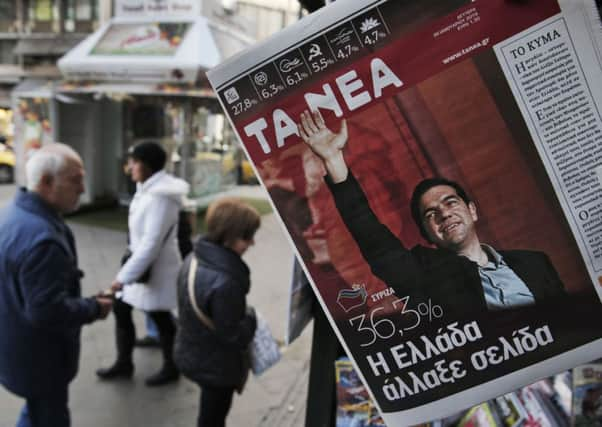Debt relief and investment in industry are the only solutions to euro crisis, says economist


Malcolm Sawyer, emeritus professor of economics at Leeds University, made the call after anti-bailout party Syriza stormed to victory in the Greek elections.
He described the change of government as “a major challenge to the austerity programme” in Europe and predicted that Spain and Portugal would follow the Greek vote for debt relief.
Advertisement
Hide AdAdvertisement
Hide AdProfessor Sawyer said pressurising countries to adopt austerity measures in return for loans was like “like having a gun stuck to your head”.
He said Greece is one of a number of countries “that needs some debt relief for a chance to get back to some degree of prosperity”.
He added: “They are between a rock and a hard place. They are in a situation where their debt is very difficult for them to repay.
“If they don’t get some relief from that debt, I think they are going to continue to go down.”
Advertisement
Hide AdAdvertisement
Hide AdGreek leftist leader Alexis Tsipras swept to power after pledging to end budget cuts and heavy tax rises that have helped send the jobless rate over 25 per cent and pushed millions into poverty.
His first action as prime minister was to commemorate Greek resistance fighters with red roses at a memorial in Athens to those executed by Nazis.
Germany has been the biggest contributor to eurozone bailouts and has led calls for budgetary rigour.
Professor Sawyer pointed out that Germany benefited from debt relief in 1953 when half of its debts were cancelled.
Advertisement
Hide AdAdvertisement
Hide AdThis move was seen as the foundation of Germany’s “economic miracle”.
As well as debt relief, Professor Sawyer said Greece needs help in boosting its productive capacity to develop products that people want to buy.
He said the European Investment Bank could use its powers to borrow from financial markets and lend money to governments in Greece and other struggling countries to invest in industrial capacity and infrastructure.
The institution is owned by EU member states.
Europe showed a willingness to give Athens more time to pay its debts, but little sign that it would yield to the new government’s demands for debt forgiveness.
Advertisement
Hide AdAdvertisement
Hide AdEuropean Union leaders and policymakers warned that a debt reduction for Greece would be against eurozone rules and would send the wrong message to other members of the single currency.
Before any talks on more time for Greece to repay its debts can start, Athens must get an extension of its existing bailout to give itself time for negotiations on future economic policy and on longer loan maturity with international lenders.
The extension of the bailout is needed because without it Athens will not be eligible for the European Central Bank’s plan of government bond purchases.
German Foreign Minister Frank-Walter Steinmeier said Berlin expected it to stick to agreements with its eurozone partners. “We offer to work with the Greek government, but we expect them to stand by agreements,” he said.
Advertisement
Hide AdAdvertisement
Hide AdThe International Monetary Fund said Greece could not demand special treatment for its debt. “There are internal eurozone rules to be respected,” IMF chief Christine Lagarde.
Professor Sawyer said EU leaders might change their tack after “looking into the abyss” of a potential Greek exit from the eurozone and the likely economic impact this will have on the currency and trading bloc.